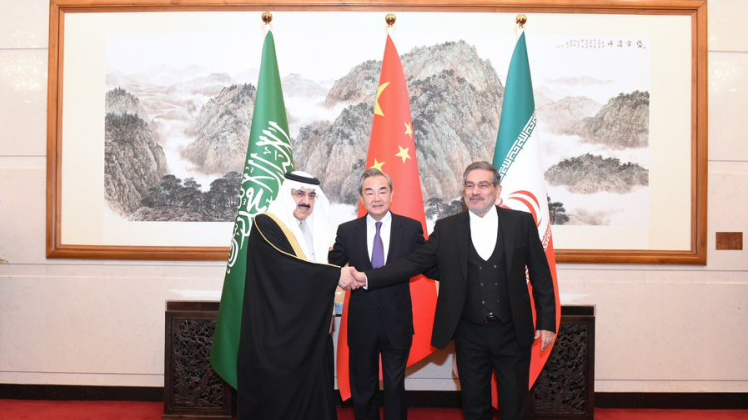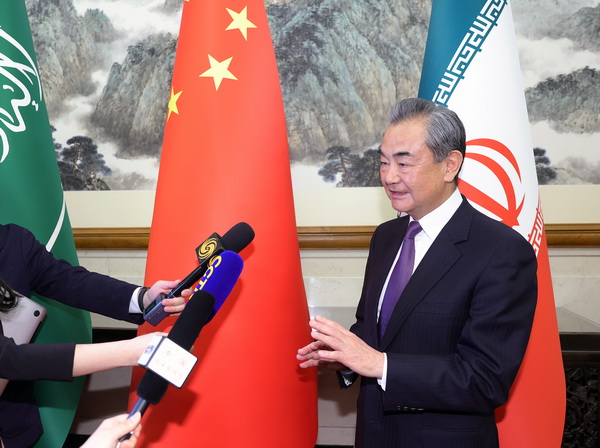
Wang Yi (C), a member of the Political Bureau of the Communist Party of China (CPC) Central Committee and Director of the Office of the Foreign Affairs Commission of the CPC Central Committee, attends a closing meeting of the talks between the Saudi delegation led by Musaad bin Mohammed Al-Aiban (L), Saudi Arabia's Minister of State, Member of the Council of Ministers and National Security Advisor, and Iranian delegation led by Admiral Ali Shamkhani (R), Secretary of the Supreme National Security Council of Iran, in Beijing, China, March 10, 2023. /Xinhua
Wang Yi (C), a member of the Political Bureau of the Communist Party of China (CPC) Central Committee and Director of the Office of the Foreign Affairs Commission of the CPC Central Committee, attends a closing meeting of the talks between the Saudi delegation led by Musaad bin Mohammed Al-Aiban (L), Saudi Arabia's Minister of State, Member of the Council of Ministers and National Security Advisor, and Iranian delegation led by Admiral Ali Shamkhani (R), Secretary of the Supreme National Security Council of Iran, in Beijing, China, March 10, 2023. /Xinhua
Editor's note: Hafijur Rahman is a columnist and Security and Strategic analyst, working in a prominent Strategic Studies Center in Bangladesh. The article reflects the author's opinions and not necessarily the views of CGTN.
After the five-day talks concluded in Beijing, diplomats have ended the seven-year-long diplomatic rift between Saudi Arabia and Iran, two regional rivals whose diplomatic hostility had threatened the stability and security in the Middle East. The dialogue was brokered by Wang Yi, Member of the Political Bureau of the CPC Central Committee and Director of the Office of the Central Commission for Foreign Affairs, and guided by Chinese President Xi Jinping. On March 10, Iran and Saudi Arabia agreed to restore diplomatic relations and reopen their embassies within two months.
The diplomatic breakthrough came at a time of much turbulence in the world, as Wang Yi said and at a time when the notion that dialogue can resolve conflicts has become just an afterthought, if not redundant. This ominous trend is conspicuous in the ongoing conflict in Ukraine, which has led to colossal humanitarian and economic misery both there and around the world, with a potential catastrophic escalation looming larger. But as a major global power, China has demonstrated the necessary goodwill.
A victory for dialogue
Iran and Saudi Arabia have had strained relations due to historic religious differences. The bilateral tensions escalated further over the conflict in Yemen and tensions in Iraq, Bahrain, Lebanon, and Syria. Meanwhile, efforts to restore ties were obstructed by major Western geopolitical stakeholders, given their enduring political stakes and vested economic interests. The landmark deal is not merely a diplomatic success for China in a region where geopolitics has been dominated by the United States. It's a manifestation on the power and wisdom of dialogue.
In hailing the diplomatic thaw between Iran and Saudi Arabia, Wang Yi aptly said: "It is a victory for dialogue and a victory for peace." Apparently, the United States played the wedge between the two rivals, by instigating ceaseless turbulence in the region.

Wang Yi, Director of the Office of the Foreign Affairs Commission of the CPC Central Committee, speaks to reporters in Beijing, China, March 10, 2023. /Chinese Foreign Ministry
Wang Yi, Director of the Office of the Foreign Affairs Commission of the CPC Central Committee, speaks to reporters in Beijing, China, March 10, 2023. /Chinese Foreign Ministry
A path worth emulating
"The world is faced not only with the Ukraine issue," said Wang Yi, citing the Western excessive focus on Ukraine issues. Accordingly, collective peace in the world cannot be ensured by disproportionately focusing their respective strategic or diplomatic energy on selective topics while letting a host of other matters to exacerbate. In helping to broker the historical agreement, China has demonstrated its commitment to egalitarian peace and security in the world.
Meanwhile, the diplomatic breakthrough has exposed the hollowness of Western policy over the conflict in Ukraine. The narrow strategic priority and ideological dogma have turned dialogue into an anathema. And if dialogue gets pursued, supporters get accused of being Moscow sympathizers.
"As a good-faith and reliable mediator" and reputed for its neutral and dispassionate worldview, China has recently pushed forward its peace plan for Ukraine, emphasizing dialogue and negotiation as "the only viable solution to the Ukraine crisis." While the peace plan was widely acclaimed by the global majority, Western policymakers showed cold-shouldered responses, while insisting on their inflammatory "as long as it takes" resolve.
(If you want to contribute and have specific expertise, please contact us at opinions@cgtn.com. Follow @thouse_opinions on Twitter to discover the latest commentaries in the CGTN Opinion Section.)